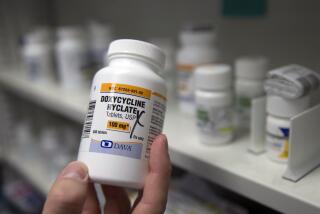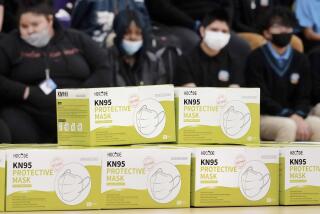Making HIV tests routine
- Share via
EVEN WITH ALL THAT IS KNOWN about HIV, there are still 40,000 new infections a year in the United States. One of the main reasons is that a quarter of those infected today don’t know it; research shows those people are behind half of all new transmissions. Hoping to change that, the U.S. Centers for Disease Control and Prevention is expected to recommend in the next few weeks that everyone between 13 and 64 should be routinely tested for HIV, just as healthy people get regular checks of their blood pressure and cholesterol.
Though the recommendation is voluntary, doctors usually heed such federal health guidelines when suggesting preventive screenings for their patients, and insurance companies usually pay for the ensuing tests. The goal is to make HIV testing part of the typical annual physical. Since testing is now so easy -- it takes as little as 20 minutes -- this is doable, cheap and could do more to stem new transmissions than almost any other available option.
More than 1 million people in the U.S. live with HIV. The disease’s stigma has fallen dramatically from even a decade ago, and antiviral medications have transformed what once was a death sentence into a condition that is often manageable. Because only 10% of Americans get tested each year, most of those unaware they are infected continue passing the virus along. According to federal research, people who know they are HIV-positive reduce risky behavior, such as having unprotected sex or sharing needles, by as much as two-thirds. Getting carriers into treatment earlier helps keep the virus in check.
Federal authorities are growing frustrated at their recent inability to curb HIV transmissions. New infections fell for much of the 1990s but have held constant for most of this decade. Lately, there have been troubling signs that rates are increasing among young gay men and minorities. Some health officials believe that unless the government significantly steps up prevention efforts, rates could climb rapidly.
One concern with broader testing is that it inevitably will lead to a higher rate of false positives. Though possible, it probably won’t happen any more than it does with screening tests for colon cancer or breast tumors. Hopefully, doctors will be able to persuade patients to look beyond their fear and get tested more regularly.
More to Read
Sign up for Essential California
The most important California stories and recommendations in your inbox every morning.
You may occasionally receive promotional content from the Los Angeles Times.










